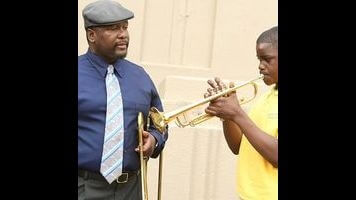Treme: “I Thought I Heard Buddy Bolden Say”

One by one, the characters of Treme are getting sucked in to the vortex of NOAH, the shady remediation program that, in this week’s most striking scene, tears down Desiree’s mother’s house. Vacant since Katrina, it had apparently been placed on two lists: one of homes to be torn down and the other of homes to be developed. Apparently one list got put on top of the other. Down comes the house. The past gives way to future and the future gets defined by those with the money to do the tearing down.
Here that’s C.J., the big-time developer whom Nelson took as a mentor last season and who pushes his one-time charge further away near the end of this episode. Why? There’s that scandal from which he needs distancing but there’s also the fact that, as C.J. puts it, “It’s not clear to me what you as an outsider can bring to this venture,” a dismissal that leaves Nelson scrambling to pick up scraps when he wants to dine at the table. Thus two of Treme’s characters end up getting screwed by NOAH, albeit in distinctly different fashions.
They’re both, in their own ways, outsiders. Nelson’s an out-of-towner who lacks the deep roots that connect those who wheel and deal and New Orleans. Desiree is black and of modest means, the sort of person who tends to get taken advantage of by those with deep roots and connections. Though not always quietly, as it turns out. Albert, Delmond and others spend part of the episode participating in a near-riot as the city council decides a NOAH-related issue concerning some projects. In the end, the Big Chief can’t even get arrested, though, because the police recognize that arresting him would give him more of a voice than leaving him teary-eyed on the sidewalk. Like so many others, he gets left behind, just another face on the news for Nelson to shake his head at or for Davis’ parents to look past as they see the up side of tearing down the projects to make way for a place with, they assume, less crime. Meanwhile, Delmond doesn’t even realize he’s playing both sides of the issues by entertaining the thought of giving C.J.’s jazz center venture credibility by lending his name, and his father’s, to the project.
NOAH has, so far at least, provided a solid center to the third season not just because it’s a shady chapter in post-Katrina New Orleans history but because Treme has compellingly portrayed it as a symptom of a larger problem: The way the powerful take advantage of the powerless. Or at least those with less power. Toni has her legal skills behind her and L.P. has the voice of the press, but good luck using either when the police feel as if they can smash your windshield and then, only a few moments later, cavalierly inform you about it as if someone else did the deed. Or pull your daughter over—as she plays a hip-hop song protesting the demolition—with no real provocation. Or, and this is always threatened, worse.
The NOAH storyline touches on another issue as well that’s been with the show all season: New Orleans’ relationship with its own past. “They say that a lot here. ‘There used to be,’” Annie's mother (the always-welcome Isabella Rossellini) says to Davis. She means it unkindly just as she means most things unkindly—though she starts to soften by episode’s end—but Davis knows the insult has some substance to it. He’s found a better angle on running a New Orleans musical heritage tour, one that takes customers past places that still stand, like the Montana family home and Sidney Bechet’s house. Sure, they’re kind of in ruins, but they’re still there. “This is New Orleans,” he tells his group, “We just let it go to hell. Preservation through neglect.” But that’s only true until preservation-through-neglect gets in the way of the future, and it’s not necessarily a future that the Desirees or the Tonis of the world would want. It may not even be one that will welcome them.
Stray observations:








































